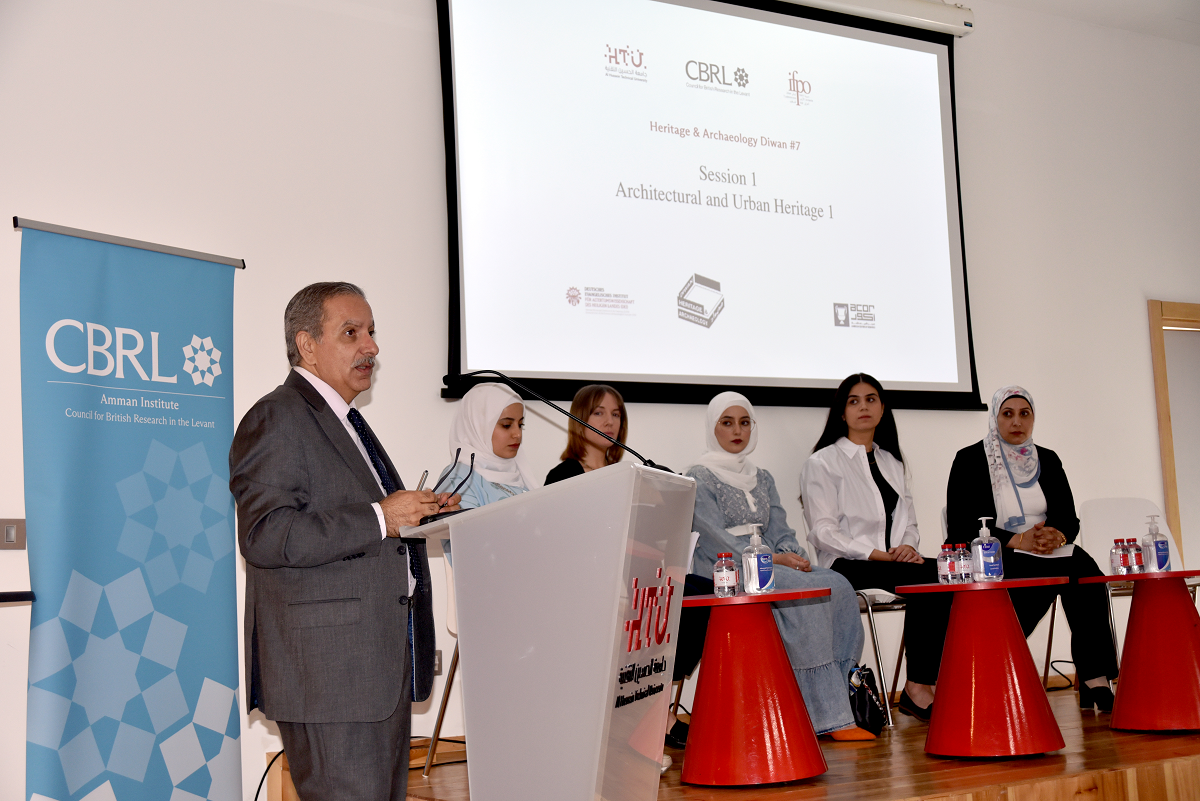This year, CBRL cooperated with the French Institute for the Near East (Ifpo) and Al-Hussein Technical University (HTU) to organise the Heritage & Archaeology Diwan #7 under the theme Architecture and Urban Heritage.
In the presence of HE the French Ambassador to Jordan, Alexis Le Cour Grandmaison, HE Prof. Fadi Bala’awi, the Director General of the Department of Antiquities, HE Prof. Ismail Al-Hinti, the President of Al-Hussein Technical University, HE Eng Ihab Amarin, the Director of the Jordan Museum, researchers, academics and students, Diwan #7 was held on 22 and 23 of July 2023 at HTU, King Hussein Business Park.
 Participants pose for a photo during the 7th Heritage and Archaeology Diwan at Al Hussein Technical University in Amman
Participants pose for a photo during the 7th Heritage and Archaeology Diwan at Al Hussein Technical University in Amman
The event drew more than 35 students and researchers to share and discuss the results of their projects on Jordan’s heritage. It was scheduled in seven sessions, where each session was followed by a panel discussion, to cover architectural and urban heritage, sites and museums management, archaeological studies, documentation, conservation, the rehabilitation of tangible heritage and the intangible heritage of Jordan.
Several speakers discussed the architecture of Amman from different perspectives—phenomenological, ethnographic, structural and functional. Participants highlighted its distinct cultural, historical and socio-economic values and their role in understanding the city, its many stories and residents’ daily lives engagement. For example, graduates from German Jordanian University described the archaeological layers underneath Amman’s city centre in a proposal for an inclusive living urban heritage network for developing downtown Amman, by revealing the recent Roman archaeological discoveries in that area.

HE Ihab Amarin, moderating the first session, Architectural and Urban Heritage with the speakers.
Our colleague from the CBRL Amman Institute, Rudaina al Momani, presented the Amman Heritage Houses project. Along with Shatha Mubaideen and Dana Salameen, they recorded, documented and assessed more than 100 houses using the EAMENA recording and condition assessment methodology, as the start of a comprehensive record of Amman’s heritage houses.
Because most of the event attendees came from an architectural background, the archaeological studies session introduced new and interesting topics that stimulated fruitful discussions between the presenters and the audience. Several topics were presented, such as the development of complex burial rituals in the southern Levant during the Neolithic Period, Safaitic Inscriptions in Jordan’s eastern desert, the Dead Sea Scrolls, the Damiya Dolmen fields, and others.

The panel discussion at the Archaeological Studies session, moderated by Jihad Haroun
On Diwan’s second day, participants in the documentation and conservation session, moderated by Dr Carol Palmer, emphasised the role of digital technologies in heritage protection, from geophysical surveys, 3D photogrammetric modelling to immersive VR experiences at several sites around Jordan.

Dr Carol Palmer, CBRL Director, moderating the Conservation and Documentation session
Later, in the intangible heritage session, presentations focused on initiatives for community engagement. Fikra, a youth-based architectural initiative, introduced their on-going work to create a digital platform and curated cultural trails for Amman, integrating the city’s tangible and intangible heritage. Later in that session, Sela for Training and Protection of Heritage presented their multidisciplinary training approach involving all community members working in Petra and at other archaeological sites in the Kingdom.

3D printed objects brought by the Yarmouk University Museum team
Professional and academic session moderators and audience members enriched the discussions and suggested to the presenters how they can refine, enrich and expand their research for publication and dissemination for a wider audience.

The audience during the discussions
The Diwan series of annual events started in 2018 as a collaboration between the Department of Antiquities, the international research institutes in Amman (Ifpo, CBRL, the American Center of Research (ACOR) and the German Protestant Institute of Archaeology (GPIA)) and universities as a simple roundtable event, This year, it has grown to attract over 90 attendees from a broad range of Jordanian universities and organisations, including the Hashemite University, Yarmouk University, Jordan University, Applied Science University, Petra Development & Tourism Region Authority and others. We are glad to see the Diwan initiative flourishing and achieving its goal of encouraging young new generations to conduct research, discuss their projects in an encouraging and critically constructive forum, and disseminate their ideas widely to academics, decision-makers and their peers.

Colleagues and friends from the event organisers and attendees.
Diwan #7 was also featured in two articles in the Jordan Times newspaper:
https://jordantimes.com/news/local/7th-heritage-and-archaeology-diwan-kicks-amman
https://jordantimes.com/news/local/heritage-and-archaeology-diwan-hears-preservation-renovation
By Shatha Mubaideen














